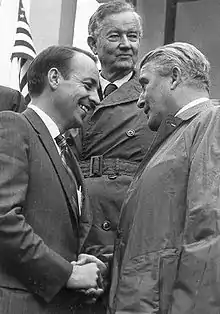Albert Brewer
Albert Preston Brewer (October 26, 1928 – January 2, 2017) was an American politician who was the 47th Governor of Alabama from 1968 to 1971.
Albert Brewer | |
|---|---|
 | |
| 47th Governor of Alabama | |
| In office May 7, 1968 – January 18, 1971 | |
| Lieutenant | Vacant |
| Preceded by | Lurleen Wallace |
| Succeeded by | George Wallace |
| 21st Lieutenant Governor of Alabama | |
| In office January 16, 1967 – May 7, 1968 | |
| Governor | Lurleen Wallace |
| Preceded by | James Allen |
| Succeeded by | Jere Beasley |
| Personal details | |
| Born | Albert Preston Brewer October 26, 1928 Bethel Springs, Tennessee, U.S. |
| Died | January 2, 2017 (aged 88) Montgomery, Alabama, U.S. |
| Political party | Democratic |
| Spouse(s) | Martha Farmer (1950–2006) |
| Education | University of Alabama (BA, LLB) |
Early life
Brewer was born in Bethel Springs, Tennessee. He attended the University of Alabama and was a member of the Delta Sigma Phi fraternity.
Political career
Prior to his election as the 21st Lieutenant Governor, he served three terms in the Alabama House of Representatives from Morgan County from 1954 to 1966. During the last of these terms, 1962 to 1966, Brewer, at 34, became the Speaker of the Alabama House of Representatives, the youngest person in state history to have held this post.[1]
In 1964, Brewer and the future U.S. Senator James B. Allen, then the lieutenant governor, were among the unpledged presidential electors on the Alabama ballot. They lost to the Republican slate committed to Barry M. Goldwater. No electors pledged to U.S. President Lyndon B. Johnson were permitted on the Alabama ballot. While national Democrats balked over Johnson's exclusion, most supported the unpledged slate, which competed directly with the Republican electors. As The Tuscaloosa News explained, loyalist electors would have offered a clearer choice to voters than did the unpledged slate.[2]
Originally an ally of George Wallace, Brewer was elected lieutenant governor in 1966 without opposition in the general election when Wallace's wife, Lurleen Wallace, was the Democratic nominee for governor.

While lieutenant governor, he was acting governor for part of a day while Governor Lurleen Wallace was out of the state for more than twenty days for medical treatment. When the constitutional provision became operative, she was immediately rushed back into the state.
After she died in office in May 1968 and Brewer became governor, he took over direct management of the state and did not solicit input from George Wallace, who was in the midst of his bid for the presidency under the American Independent Party. Thus, Brewer began to work to be elected as governor in his own right in 1970. In that effort, he gained an important ally in U.S. President Richard M. Nixon, who had defeated Wallace in the 1968 presidential election and sought to neutralize Wallace as a potential adversary in 1972.[3] Brewer's 1970 gubernatorial campaign, however, was revolutionary in many respects. Although earlier in his political career he was regarded as a segregationist but not a race-baiter,[4] Brewer refused to engage in racist rhetoric and courted newly registered black voters. He hoped to build a coalition of blacks, educated middle-class whites, and working-class whites from northern Alabama, traditionally a more liberal part of the state. He unveiled a platform calling for more funding for education, an ethics commission and a commission to revise Alabama's 1901 state constitution, which had been deliberately framed to disenfranchise blacks and poor whites.[5]
Brewer led Wallace in the Democratic primary but failed to win an outright majority. He then faced Wallace in a runoff. Running openly against the "black bloc" vote, Wallace slurred Brewer and his family.[6] Wallace narrowly won the Democratic runoff[6] and won the general election in a landslide.
Later life
After years of private law practice, Brewer served as Distinguished Professor of Law and Government at Samford University's Cumberland School of Law. Before his death, he taught a course on Professional Responsibility at the Cumberland School of Law. He was also an active leader with the Alabama Citizens for Constitutional Reform since 2000.
On January 2, 2017, Brewer died in Jackson Hospital, Montgomery, Alabama, at 88.[7][8][9]
Honors
Albert P. Brewer High School in eastern Morgan County is named in honor of Brewer. The school opened in 1972. Its patriot mascot is named Preston, Governor Brewer's middle name.
Notes
- Encyclopedia of Alabama-Albert P. Brewer
- The Tuscaloosa News, reprinted in The Birmingham News, September 5, 1964
- Kornacki, Steve (2011-05-09) Rick Santorum and the problem with the "loser" label Archived May 11, 2011, at the Wayback Machine, Salon.com
- Time
- Rogers, William Warren, et al. Alabama: The History of a Deep South State. Tuscaloosa: University of Alabama Press, 1994, 576.
- Rogers, 576
- http://www.decaturdaily.com/news/local/funeral-arrangements-for-former-gov-albert-brewer
- Staff (January 2, 2017). "Albert Brewer, Alabama's 47th governor, dies at age 88". Archived from the original on January 3, 2017. Retrieved January 3, 2017.
- Archibald, John (January 2, 2017). "Former Alabama Gov. Albert Brewer has died". AL.com. Retrieved January 3, 2017.
External links
| Political offices | ||
|---|---|---|
| Preceded by James Allen |
Lieutenant Governor of Alabama January 16, 1967–May 7, 1968 |
Succeeded by Jere Beasley |
| Preceded by Lurleen Wallace |
Governor of Alabama May 7, 1968–January 18, 1971 |
Succeeded by George Wallace |

